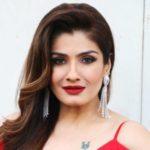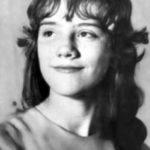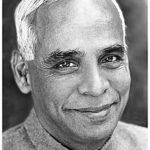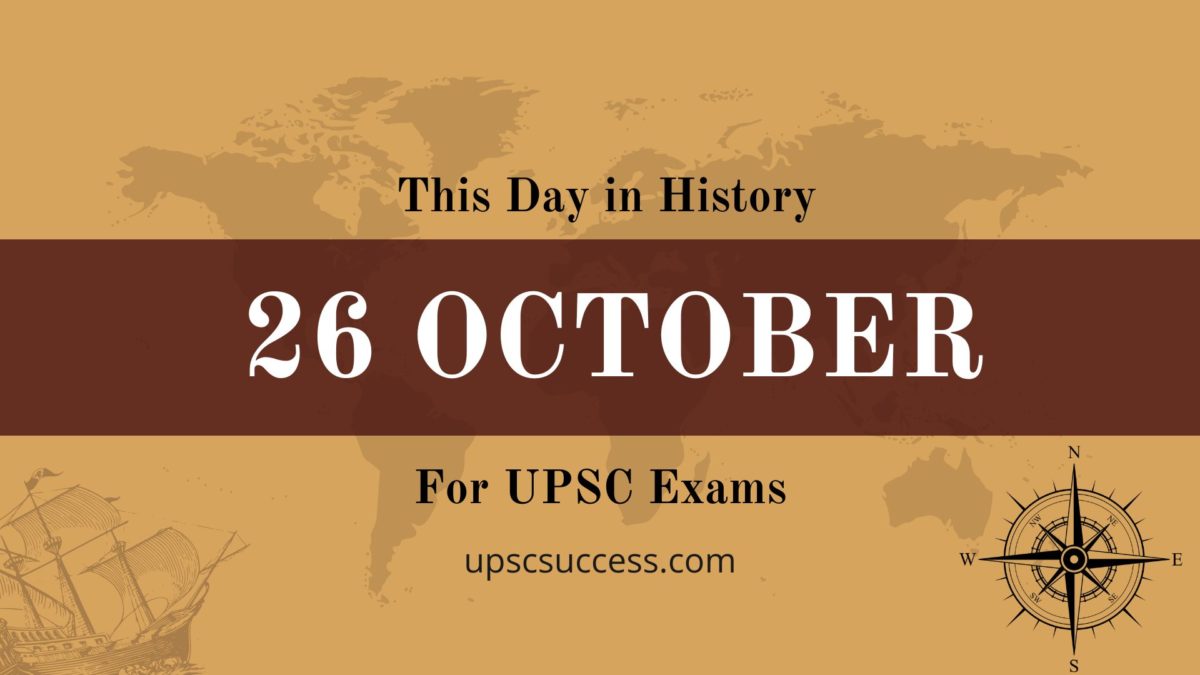Contents
This Day in History on 26 October
The historical events hold a lot of value for aspirants who are sitting for UPSC competitive exams including the IAS Exam.
On this page, we will list all historical events that occurred on 26 October. The students can refer to them while preparing for all competitive exams and banking exams.
Important Days
Intersex Awareness Day
Accession Day (Jammu and Kashmir, India)
Important Events
1814: British General Governor declared war against Nepal.
1863: The Football Association was founded.
1930: Gulal Bai Parekar, a a14-year-old girl led a 13-girls team to hoist the national flag at Esplanade Park. A police sergeant tried to snatch the flag and then kidnapped her.
1932: Indian Muslim leader demands that Gandhi be released from prison. The Viceroy responded that this was only possible if Gandhi disassociated himself from the civil disobedience campaign.
1934: Akhil Bharatiya Gramin Udyog Sangh (All India Small Scale Industries Association) was founded and inaugrated by Mahatma Gandhi.
1936: The first electric generators on Hoover dams were fully operational.
1947: After the partition of India Pakistan, the Hindu king of the Muslim-majority state of Jammu and Kashmir decided to go with India on the day of attack from Pakistan.
1947: Maharaja Hari Singh agreed to the accession of Jammu and Kashmir to India by signing the Instrument of Accession with India. This day is now also called ‘Accession Day’.
1947: After the tribal column, raping and looting along the way by Pakistani Army continued at Baramulla, 50 kilometres from Srinagar. Maharaja of Jammu & Kashmir Hari Singhji, then, signed the instrument of accession with India and the Indian Armed Forces reacted to the Pakistani Army’s infiltration. Great acts of personal gallantry and collective bravery were shown in the Kashmir operations. Major Som Nath Sharma was awarded the PVC, India’s highest decoration for valour, and Brigadier Usman, commanding the 50th Parachute Brigade, was awarded the MVC. Both the soldiers were awarded posthumously.
1950: Mother Teresa founded Mission of Charity in Calcutta, India.
1956: On the third day of the ongoing fighting between the protesters and the Soviet army, Hungarian new Prime Minister Imre Negi appealed to the people to maintain peace.
1958: Pan American Airways launched its first commercial airline.
1961: Heavy fighting flared up between India and Communist China in their three-year-old dispute over border lines in the Himalayas. Each side accused the other of initiating the fighting that began along the Tibetan border early in October.
1962: After Chinese attack, Emergency and Defence of India Ordinance was declared for the first time in India by the President.
1969: Neil Armstrong, the first men to land on Moon by ‘Apollo II ‘, and Edwin Aldrin came to Bombay.
1994: A peace treaty was signed between Israel and Jordan, ending the 46-year-old war.
1995: India decides to go ahead with Integrated Guided Missile Development Programme in the wake of US stand to supply $370 million arms package to Pakistan.
1999: National Chemical Laboratory (NCL) researcher VV Ranade was awarded a Golden Jubilee Fellowship by the Central Government.
1999: India is re-elected to United Nations Environment Programme (UNEP).
2006: The India New Domestic Violence laws were passed. These laws aim at protecting women from domestic violence related to dowries and violence committed against women from partners, husbands, and in-laws. This law is termed as Protection of Women from Domestic Violence Act, 2005.
Birth/Birth Anniversary
899 AD: Alfred the Great, King of Wessex.
1270: Saint Namdev, Indian saint.
1886: Pandit Godabarish Mishra was a poet and notable socialist known for his contribution to Odia literature.

1890: Ganesh Shankar Vidyarthi was a journalist and a leader of the INC and an independence movement activist. He was also the editor of revolutionary weekly ‘Pratap’.
1891: Padmabhushan Vaikunthbhai Mehta, Indian promoter of the Sahakari movement.
1900: Ezra Mir, Indian film director, the pioneer of documentary production.
1916: François Mitterrand, French statesman, the 21st President of France.
1919: Mohammad Reza Pahlavi, Shah of Iran.
1923: Ram Prakash Gupta was the CM of Uttar Pradesh and Governor of Madhya Pradesh. He was a leader of BJP, as well as its predecessor party, the Bharatiya Jana Sangh.
1932: Chinadorai Deshmutu, Indian field hockey player (Olympics-1952), was born.
1935: Ashok P.Jain, great industrialist, was born.
1937: Hridaynath Mangeshkar, Indian musician, and singer.
1947: Hillary Clinton, American politician, diplomat, lawyer, writer, public speaker, and the 67th Secretary of State of the United States.
1950: Tirumalai Echambadi Srinivasan, cricketer (Indian opening batsman 1981), was born in Madras.
1954: Lakshmikant Berde, an Indian actor who worked in Hindi and Marathi films.
1971: Preeti Singh is an author who has been working as a professional writer since 15 years before authoring her two best-selling novels.

1974: Raveena Tandon is an actress, model, and producer. Starting her career in modelling, Raveena later made her acting debut in Patthar Ke Phool, which won her the Filmfare Award for New Face of the Year.
1978: Sussanne Khan is an interior and fashion designer.
1985: Asin Thottumkal, also called Asin, is a former actress who appeared in Tamil, Hindi, and Telugu films. Aside from that she is a trained bharatanatyam dancer.
1991: Amala Paul is an actress who mainly appears in Tamil, Malayalam, and Telugu films.
1995: Megha Akash is an actress who appears in Tamil, Telugu, and Hindi language films.

Death/ Death Anniversary
1909: Ito Hirobumi, Japan’s first prime minister.
1928: R.S.Das, a law member of the Viceroy’s council, died in Calcutta.
1930: Dr. Waldemar Modecal Haffkine, famous scientist, bacteriologist and professor, died in Paris. He had invented the Cholera vaccine in 1893 and a vaccine for Plague in 1897 at the Grant Medical College, Bombay.
1955: Pandit Dattatreya Vishnu Paluskar was a Hindustani classical vocalist who was considered a child prodigy.
1957: Gerty Cori, an Austro-Hungarian-American biochemist.
1965: Sylvia Likens, 16-year-old group torture/murder victim in Indianapolis (b. 1949)
1979: Chandulal Nagindas Vakil, Indian economist.

1981: Dattatreya Ramachandra Bendre was a Kannada poet of the Navodaya Period.
1990: V. Shantaram, veteran film producer, director and Dadasaheb Phalke awardee, died at the age of 90 years in Bombay.
1991: Anantrao Bhalerao, freedom fighter, journalist and editor of daily newspaper ‘Marathwada’, died.
1999: Eknath Easwaran was a spiritual teacher, author, translator, and interpreter of Indian religious texts such as the Bhagavad Gita and the Upanishads.
2000: Manmath Nath Gupta was a revolutionary writer and author of autobiographical, historical, and fictional books in Hindi, English, and Bengali.
2007: Arthur Kornberg, an American biochemist who won the Nobel Prize in Physiology.

